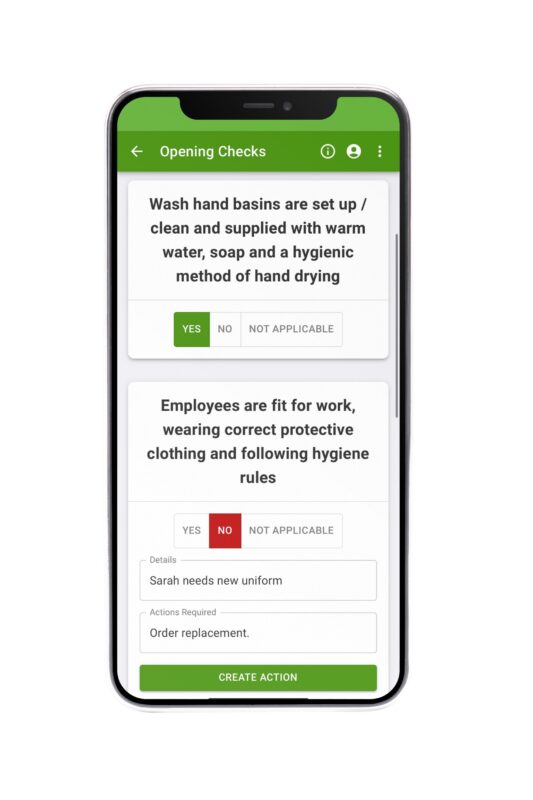Digital Food Safety System
Save time, reduce hassle and keep your business inspection-ready.
Food safety is a critical concern for any business involved in the production, processing, or distribution of food products. To ensure the highest food safety standards, implementing Food Safety Management Systems (FSMS) is critical. This comprehensive article will walk you through everything you need to know about FSMS, from its definition to its importance and implementation.
It’s important to remember that to run a fully compliant food business, you need to have a full safety management system in place, food safety is just one piece of the compliance puzzle. That’s why we provide all members with a full system that covers Food and Hygiene, Health and safety as well as Fire Safety requirements. But for now, let’s focus on how you can manage food safety.
A Food Safety Management System (FSMS) is a systematic approach to controlling food safety hazards within a food business. It is a comprehensive system of procedures, practices, and documentation designed to ensure that food products are safe for consumption. An FSMS typically includes hazard analysis, preventive controls, monitoring procedures, corrective actions, and verification processes. The primary goal of an FSMS is to prevent foodborne illnesses and protect consumers by identifying and managing potential risks throughout the food production and distribution chain.
Implementing a Food Safety Management System is crucial for any business involved in the food industry, regardless of its size or scope. Here are some key reasons why you need an FSMS:
When it comes to implementing a Food Safety Management System, businesses have two main options: paper-based systems and digital systems.
Paper-based Systems:
Digital Systems:
Whilst paper-based systems may seem simpler at first, a digital food safety management system often proves more efficient and effective in the long run, especially as businesses grow and food safety requirements become more complex.
For small and independent food businesses, implementing a comprehensive Food Safety Management System can often feel overwhelming. The challenges are numerous:
These challenges can make food safety management a real pain point for smaller operations. However, it’s crucial to remember that food safety is not just a legal requirement but also a fundamental aspect of running a successful food business.
Recognising these unique challenges faced by smaller businesses, we’ve developed our Food Safety Management Systems specifically tailored to meet those needs. Both our paper based and digital system have been designed to perfectly suit the needs of an independent business.
By simplifying the process and providing ongoing support, we aim to make food safety compliance accessible and manageable for small businesses, helping you maintain high standards without overwhelming your resources.
Remember, food safety is an ongoing commitment. It requires constant vigilance, regular updates, and a culture that prioritises safety at every level of your organisation. With the right systems, training, and mindset in place, you can confidently produce safe food products whilst building trust with your customers and regulatory bodies alike.
Our Safety Management Systems and all related documents have been subject to review and approval by Royal Borough of Greenwich, Monmouthshire Council and East Sussex Fire Service as part of our Primary Authority Partnerships.
A Primary Authority Partnership is a legal partnership between a business (such as NCASS) and a Local Authority. It allows for the development of business focused advice on meeting Environmental Health (Food Safety and Health and Safety), Trading Standards or Fire Safety Regulations.
Simplify Compliance, Save Time, and Reduce Hassle. Our food safety software will give you peace of mind in a handy paperless digital system.
Customisable daily digital checklists, actions and secure digital record-keeping on the go. With our new DSMS, compliance has never been easier. From temperature monitoring to cleaning lists, team task allocation to delivery management, allergen management and much more, it makes maintaining high safety standards and solid food safety processes easy and helps you score a better food hygiene rating.
Use the DSMS ‘Actions’ feature to create reminders for your teams, make to do lists and set corrective measures for individuals. This useful communication feature can demonstrate to Environmental health offices (EHO) during an audit or inspection that the system is being properly implemented and you are taking corrective actions where necessary in line with the legal requirements of HACCP and your risk assessments.
That’s not all, our it also includes a full digital compliance manual based on our paper based Safety Management System.
Find out more: https://www.ncass.org.uk/digital-safety-management-system/


A concise printed system to guide your business through the minefield of technical and operational compliance.
Guidance and online tools to create Food Safety, Health and Safety and even Fire Safety Risk Assessments.
Operational Checklists and plans, Daily Records, Temperature Recording, helpful Additional Resources and much more.
Also Included in all memberships – the system has been developed to assist food and drink businesses to comply with Food Safety and Hygiene, Health and Safety and Fire Safety requirements.
It has been developed to assist food and drink businesses to comply with, and exceed the operational / technical requirements for Food Safety and Hygiene, Health and Safety (H&S) and Fire Safety.
Following the processes set out in the system is the most efficient way to regulate Food Safety and Health & Safety within your business.
You can read more about our paper based system here
https://www.ncass.org.uk/safetymanagementsystem/
Compliance and regulation support is the main reason our members join when they start a business, and stay with us as they grow. Other membership benefits that help you and your team members are:
And much, much more.
Our mission is to help our members succeed by providing the products, services and support necessary for their businesses to thrive.
Take a look at the full list of membership benefits, features and pricing or give us a call on 0300 124 6866 for more information on how to become a member.

Software, systems and resources that simplify running your business.

A helping hand to ensure your business stays on the right track.

Deals, cashback and vouchers that make it’s easy for membership to pay for itself.